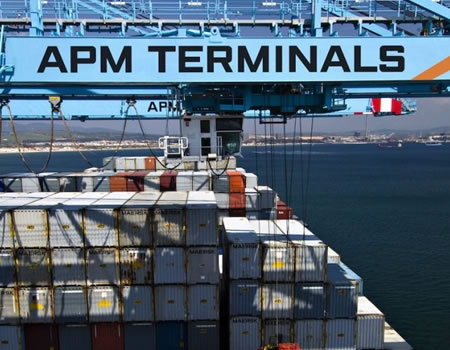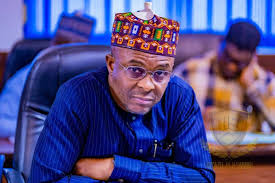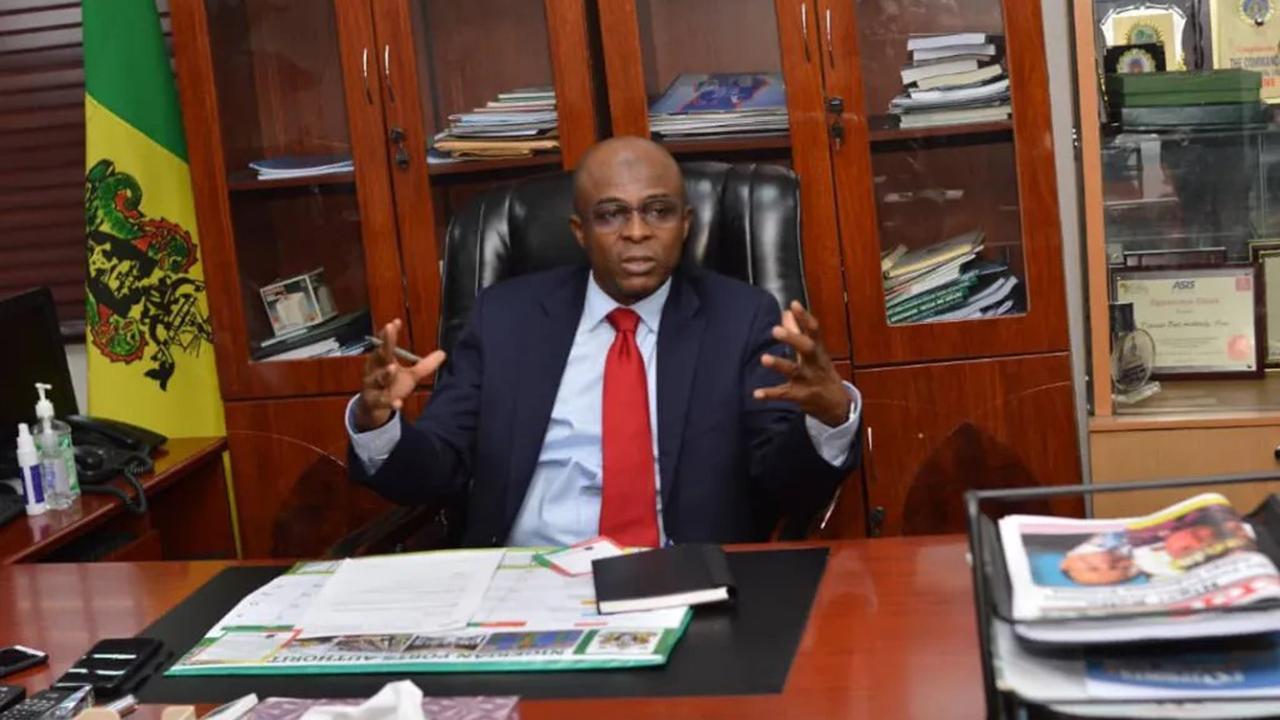How Dantsoho reforms are transforming trade, raising efficiency at ports
While Nigeria grappled for decades with dilapidated infrastructure, congestion, manual operations and systemic inefficiencies, among other challenges, it lost a significant volume of its cargo traffic to neighbouring countries that had modernised their port systems. In response, the Managing Director of the Nigerian Ports Authority (NPA), Dr. Abubakar Dantsoho, embarked on a comprehensive transformation of the nation’s port infrastructure on assumption of office in July 2024, a move that has begun to yield tangible results, particularly in improved trade performance, ADAKU ONYENUCHEYA reports.
Nigeria’s seaports have over the past decades struggled under the weight of inefficiencies, neglect, congestion, lack of automation and modernisation, as well as aging and decaying infrastructure causing the country to lose significant cargo traffic to neighbouring nations in West and Central Africa.
From Tin Can Island and Apapa Ports in Lagos to the Eastern ports in Rivers, Delta and Cross River States, Nigeria’s ports have long been plagued by deteriorating infrastructure, shallow draft limitations and inefficient cargo-handling systems.
The consequences have been dire as Nigeria has lost a significant share of West Africa’s cargo business to Benin Republic, Côte d’Ivoire, Ghana and Togo, whose ports have undergone rapid upgrades.
According to data from the Shippers’ Association Lagos State (SALS), this cargo diversion costs Nigeria an estimated N1 trillion yearly. Even the Managing Director of the Nigerian Ports Authority (NPA), Dr. Abubakar Dantsoho, acknowledged that aside from the Lekki Deep Seaport, the country’s remaining six ports are grappling with decrepit infrastructure, including silted channels, collapsed breakwaters and failing quays.
In response to these challenges, the Federal Government, through the NPA and the Federal Ministry of Marine and Blue Economy, launched a comprehensive port rehabilitation agenda. At the heart of this initiative is a $1 billion port rehabilitation and modernisation project flagged off in 2024, with the aim to overhaul key terminals, improve navigational channels, and restore Nigeria’s maritime competitiveness.
Determined to ensure that Nigerian ports benefit from the expected increase in intra-African trade under the African Continental Free Trade Area (AfCFTA), Dantsoho has taken deliberate steps to reposition the ports and strengthen their competitive strategy against rival ports in the region. This repositioning extends beyond physical upgrades as it also includes digital transformation, enhanced security systems and workforce capacity building.
Dantsoho’s port modernisation initiative is designed to place Nigeria’s ports at the forefront of regional competition and improve operational efficiency, with the ultimate goal of reclaiming lost cargo traffic and restoring the country’s status as a transshipment hub.
“The Authority has embarked on a port modernisation project aimed at revamping the country’s dilapidated port infrastructure. The Lagos Port Complex and Tin Can Island Port Complex will serve as pilot projects,” Dantsoho said.
Among the key reforms are the implementation of the Port Community System/National Single Window, automation of operations, establishment of Export Processing Terminals (EPTs) and the Truck Electronic Call-up System also known as ETO.
These initiatives aim to eliminate paperwork, reduce human contact and cut corruption-related delays. For years, Nigeria’s port system has operated under a manual and uncoordinated structure, with multiple agencies conducting overlapping checks, leading to inefficiencies and delays. Vessels frequently face long waiting times due to congestion, while exporters and importers grapple with logistical nightmares caused by poor port access roads, limited automation and corruption involving both state and non-state actors.
According to Dantsoho, the PCS, which will evolve into a National Single Window, is a digital collaborative platform designed to facilitate seamless exchange of information among port stakeholders that will also serve as a one-stop payment portal for all port-related activities.
He said the PCS is envisioned to become the NSW for maximum efficiency and competitiveness, noting that the NPA is collaborating with the International Maritime Organisation (IMO) to actualise the project.
Unlike many countries that have fully embraced port automation, Nigeria’s manual processes have made it vulnerable, with over 60 per cent of Nigerian-bound cargo being redirected through neighbouring West African ports. In response, the NPA introduced automation across all its operational processes, while Dantsoho emphasised that automation requires robust and modern infrastructure.
For example, modern ship-to-shore cranes used in container operations can only be deployed on reinforced quay aprons.
“Automation of our operations will be a major paradigm shift in port efficiency. It is expected to reduce the turnaround time of container vessels from days to just hours,” he noted.
One of the longstanding challenges facing Nigeria’s ports is their shallow draft, which limits the ability to accommodate larger, modern vessels. The completion of the Lekki Deep Seaport, with a draft depth of over 16 metres, has positioned Nigeria to reclaim its competitive edge among regional peers.
Dantsoho confirmed that additional deep seaport projects are underway, including those in Badagry, Ibom, and Calabar. He added that with the deployment of skilled manpower to these ports, Nigeria is on track to becoming a regional maritime leader.
On export reforms, the NPA, in collaboration with the Nigeria Customs Service, has approved the establishment of six Export Processing Terminals (EPTs) in the Lagos area to streamline the handling of export cargoes.
“All export cargoes are processed and certified fit before being transported to the ports for loading onto vessels. The establishment of the EPTs has led to steady growth in our export volumes,” Dantsoho stated.
For decades, Nigeria’s port corridors suffered from chronic congestion, with numerous interventions by both the federal and state governments failing to resolve the issue.
In a significant turnaround, the NPA partnered with Messrs Trucks Transit Park (TTP) Limited to implement the Truck Electronic Call-Up System, aimed at decongesting the Lagos Pilotage District.
The digital platform has transformed port operations by streamlining the scheduling of truck movements, enabling real-time coordination and improving cargo evacuation from the ports to the hinterland. The initiative has brought relief to previously gridlocked port access roads and restored sanity to Apapa and Tin Can corridors. To date, over 70,000 trucks have registered with TTP, allowing for the electronic scheduling and orderly delivery of containers to the ports.
One of the most notable achievements of this effort is the improved ease of doing business, with significant reductions in turnaround times for cargo movement. Dantsoho described this reform as a critical step in positioning Nigeria’s ports to benefit from growing intra-African trade.
With trade barriers across Africa collapsing under the African Continental Free Trade Area (AfCFTA), he emphasised the urgency of ensuring Nigerian ports are competitive.
“Our vision is to become the maritime logistics hub for sustainable port services in Africa. In the quest to optimise the benefits accruable from AfCFTA, it is evident that ports play a pivotal role as nodal points in international logistics,” Dantsoho said.
He highlighted that port costs are a significant component of overall freight charges, which directly impact the price of goods in the marketplace. Dantsoho said this speaks to the imperativeness of making the nation’s ports more competitive and efficient, adding that achieving this goal requires strategic collaboration among all stakeholders in the port ecosystem. He further explained that port competitiveness hinges on three key pillars – institutions, infrastructure, and macroeconomic conditions. He stressed that strong institutions provide the regulatory and governance frameworks needed for stable, predictable operations.
“Infrastructure remains the cornerstone of port competitiveness. Its quality influences operational efficiency, transport costs, trade volumes, and long-term strategic viability,” he added.
He pointed out that investments in inland container terminals, logistics zones, and rail connectivity could significantly expand a port’s reach beyond its immediate hinterland, thereby boosting its operational appeal and competitiveness. On macroeconomics, Dantsoho observed that the broader economic environment plays a crucial role in port performance.
“Factors such as inflation, exchange rates, and overall economic stability influence trade flows and investment decisions. A stable macroeconomic framework enhances investor confidence and supports sustained growth in port activities,” he said.
The Guardian learnt that following the repositioning of Nigeria’s port system to enhance operational efficiency, the NPA intensified efforts to foster collaboration aimed at boosting export activities.
It was gathered that Nigeria recorded a trade surplus of N5.81 trillion ($3.7 billion) in the third quarter of 2024, according to a Foreign Trade Alert issued by the Nigerian Economic Summit Group (NESG). This milestone was largely attributed to export transactions facilitated through NPA-managed platforms.
Reaffirming the Authority’s commitment to supporting export growth, Dantsoho, assured members of the Nigerian business community of continued partnership to strengthen export logistics and competitiveness.
Speaking during a courtesy visit by the Chief Executive Officer of Nigeria LNG Limited, Dr. Phillip Mshelbila, at the NPA headquarters, Dantsoho acknowledged NLNG’s strategic role in the country’s economic development and export performance.
“Guided by the mandate of the Honourable Minister of Marine and Blue Economy, Mr. Adegboyega Oyetola, for the NPA to support the Federal Government’s increased export orientation, we are committed to deepening our partnership with NLNG,” Dantsoho stated.
In his remarks, Mshelbila commended the NPA for its consistent support, and expressed optimism about deepening collaboration as Nigeria LNG expands its production capacity in response to rising global demand for liquefied natural gas.
Dantsoho further emphasised the need for the NPA to remain competitive amid increasing rivalry from regional ports in neighbouring countries. He pledged to drive reforms that would enhance operational efficiency, reduce logistics costs, and significantly improve user experience across Nigerian seaports.
“As we embark on this journey together, I want to reaffirm our primary objective to reposition the NPA for enhanced productivity, improved revenue generation, and a better user experience at our ports.
“We must rise to the challenge posed by intense competition from our neighbours. This requires us to work tirelessly to improve efficiency, reduce operating costs, and deliver world-class service to port users,” he said.
Dantsoho called for unity of purpose among the Authority’s workforce and stakeholders, stating that collaboration and teamwork were critical to achieving set goals.
“I am confident that with our collective efforts, we can meet our predetermined objectives. I challenge every stakeholder and staff member to come with me on this transformative journey,” he said.
He also pledged to prioritise staff welfare, promising timely payment of emoluments, enhanced compensation, and targeted training programmes to build capacity, particularly for employees who demonstrate value in their roles.
“Let me assure you that we will pay closer attention to staff welfare. We are committed to timely remuneration and will address training and capacity development, especially for deserving personnel,” he added.
It could be recalled that upon assuming office in July 2024, Dantsoho pledged to reposition the agency for increased productivity and greater efficiency in revenue generation.
Just one year later, that promise is yielding remarkable results as the NPA revenue soared from N424.2 billion in 2023 to a record N893.6 billion in 2024, representing a 111 per cent increase.
This performance not only surpassed expectations but also reignited national discussions on the untapped economic potential of Nigeria’s seaports. This surge in revenue has been attributed to a deliberate and strategic approach anchored on digital transformation, targeted investments and a culture of fiscal transparency.
In a bid to further strengthen revenue streams and plug financial leakages within the maritime industry, Dantsoho championed the aggressive digitalisation of port operations, notably through the deployment of a robust Port Community System (PCS).
This initiative, alongside broader automation reforms, is curbing corruption, boosting operational transparency and significantly enhancing port productivity.
Beyond fiscal milestones, Dantsoho’s impact is being deeply felt in the institutional culture of the NPA. His leadership has ushered in a new era of employee welfare and industrial harmony, breaking long-standing bureaucratic bottlenecks and addressing workforce grievances that had lingered for years.
With the unwavering support of Oyetola, the Minister of Marine and Blue Economy, Dantsoho implemented critical reforms, including the long-delayed promotion examinations, which had previously stalled staff career progression.
This move has rejuvenated morale across the Authority and earned commendations from key unions such as the Maritime Workers Union of Nigeria (MWUN) and the Senior Staff Association of Statutory Corporations and Government-Owned Companies (SSACGOC).
Since his appointment on July 11, 2024, Dantsoho’s bold reforms and visible achievements have earned him widespread accolades.
Several national media organisations named him “Man of the Year” in recognition of his transformative leadership within Nigeria’s maritime sector. Among his notable accomplishments is the successful implementation of President Bola Tinubu’s national strategy to reduce petroleum imports, a move that significantly lowered the country’s foreign exchange demand.
He also led Nigeria’s full membership into the International Port Community Systems Association (IPCSA), a key step in enhancing trade transparency through the NSW initiative.
His diplomatic efforts further yielded Nigeria’s re-admission into Category C of the International Maritime Organisation (IMO), a critical achievement that reaffirms the country’s relevance in global maritime governance.
In recognition of these contributions, The Reporters Nigeria Magazine honoured Dantsoho as “Man of the Year,” commending his role in transforming the NPA into a strategic hub for sustainable maritime logistics, supporting national economic growth and job creation.
“Recognised as the first Nigerian to be elected President of the Port Management Association of West and Central Africa (PMAWCA), Dantsoho’s influence transcends Nigeria, positioning the country as a key player in regional maritime leadership,” the magazine noted.
In his acceptance speech, Dantsoho expressed gratitude for the continued support and guidance of the minister, pledging to use the recognition as a motivation to deepen reforms at the NPA.
“We remain committed to deploying efficiencies that will grow our national economy. This recognition will inspire us to go even further in advancing trade facilitation and fostering economic transformation through the port sector,” he stated.












